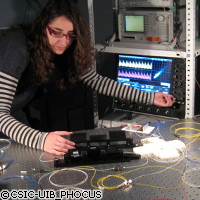EU project PHOCUS is on fast photonic systems
We have witnessed major advances in optical information processing over the years but there are still some hurdles we need to jump over if we want to secure better photonics networks. The PHOCUS ('Towards a photonic liquid state machine based on delay-coupled systems') project is meeting this challenge head on; it is designing and launching photonic systems that communicate through light for fast signal and versatile handling. The project is funded under the 'Information and communication technologies' (ICT) Theme of the EU's Seventh Framework Programme (FP7) to the tune of EUR 1.81 million. Coordinated by Universitat de les Illes Balears (UIB) in Spain, the PHOCUS project partners say their innovative systems will have the capability to perform complex computations such as processing large amounts of data quickly and efficiently. The researchers compare this novel computing to how quickly the human brain processes information. 'It is one of the biggest unresolved questions in brain research, how the electrical discharges of billions of neurons are organised to deliver correct answers in such a short time,' explained Professor Claudio Mirasso from UIB's Institute for Cross-Disciplinary Physics and Complex Systems (IFISC), who is also heading the project. 'However, in recent years a paradigm has been developed in neuroscience that might lead to the answer.' Neuroscientists say the human brain responds to external stimuli just as liquid responds to external perturbations. A pebble thrown into water is one example. It is fairly easy to determine where and when the pebble hits the surface thanks to the waves that are produced by contact. The researchers say transient responses of neural networks can be used to provide information about external stimuli. Stimuli or inputs are fed into these networks that are called 'reservoirs'. The PHOCUS partners point out that existing computer models of neural networks are not easy to train because interactions among the model's elements must be thoroughly re-adjusted for different inputs. This is where reservoir computing comes in; this method leaves the reservoir untouched and trains only the readout of processed data. 'Preliminary experiments indicate that this is far easier than training the reservoir itself,' said Professor Jürgen Kurths of the Potsdam Institute for Climate Impact Research in Germany, a PHOCUS partner. By leaving reservoirs alone and allowing external stimuli or 'inputs' to stay detectable for some time, reservoir computing lets the input's memory, together with the emerging response of the reservoir, convert the input into several dynamical states of the reservoir. The end result is a high-dimensional state space. Identification of the reservoir's responses to various inputs becomes simpler thanks to this high-dimensional state space, the partners say, adding that the identification can be used to classify different inputs. The PHOCUS team says photonic systems help show how useful complex collective behavior is, and help us to better understand and even mimic brain functions. It should be noted that while photonic systems are compatible with the telecommunications sector, integrating larger photonic systems could be both costly and tricky. Kicked off in January 2010 and scheduled to end in 2012, PHOCUS has already identified a fresh approach to make the complex network operate with a limited number of photonic components. The upshot of photonic implementations of reservoir computing operating at high data rates is that users would have access to systems that do the same job by consuming less power and eating up a lot less space. The PHOCUS partners are from Belgium, Germany, Spain and France.
Countries
Belgium, Germany, Spain, France



